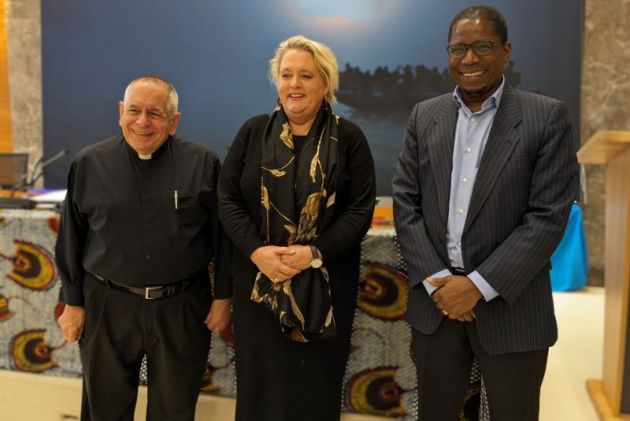Faith sector's engagement with migrants, refugees for health and HIV services highlighted

A gathering at the World Council of Churches has highlighted the right to health and dignified access to it, as well as the faith sector's engagement with migrants and refugees for health and HIV services in fighting stigma and discrimination
Workshop facilitator Monsignor Robert J. Vitillo, general secretary of the International Catholic Migration Commission, thanked UNAIDS and PEPFAR, the US President's Emergency Plan for AIDS Relief, for supporting faith communities in health.
"We want to have a call for action," Vitillo said at the workshop as speakers recalled days gone by when some international groups did not welcome faith-based groups into the discourse on health, HIV, and AIDS.
Rev. Kenneth Mtata, the WCC's director of Public Witness and Diakonia, made welcoming remarks.
"The UNAIDS-PEPFAR Faith Initiative is one of the key global success stories of interfaith engagement platforms in health and the HIV response," said Mtata.
The March 12-14 workshop is titled "Strategic Engagement of the faith sector with migrants, refugees, and other displaced populations for increased access to Health and HIV Services."
Vitillo referred to the involvement and engagement of faith-based organizations with migrants and refugees in different circumstances and worldwide.
"Engaging the faith sector increases access to both health and HIV services for migrants, refugees, and other displaced populations," said Vitillo. "It's essential for several reasons. One is that faith communities and faith institutions have a trusted presence within communities.
"And also, we have our infrastructure for care that's present, and it's very important because in many communities, people first go to religious institutions to deal with many problems, social as well as health problems, economic problems, and social problems."
Vitillo stressed that most faith communities serve all people, not just those from their own particular faith group. This brings essential force and strength to the world's response to the situation of migrants and refugees.
COVID-19 PANDEMIC
He referred to the COVID-19 pandemic, which slowed down progress in response to other health crises.
"That interrupted much of the progress that we made in promoting health and promoting access to health, that we've committed to making huge progress by 2030, so we have much catching up to do because of the COVID challenge," said Vitillo.
"And also, we have serious challenges of other illnesses, chronic non-communicable diseases, which have a heavy impact on migrant and refugee populations, antibacterial resistance, mental health challenges, which maybe we're more sensitive to than we were before the COVID pandemic."
Not enough mention of non-governmental and civil society groups in the health sphere is made, he noted.
Mtata said that Christianity and other faiths affirm the sacredness of all human beings and the sanctity of creation.
"The values of love, justice, and peace compel faith communities to respond to the needs of the marginalized and excluded," said Mtata.
"When people leave their country of origin, one of the first rights to be affected is the right to health, increasing their vulnerability. Women, young people, and children are highly vulnerable to gender-based violence, including rape," said the WCC director.
"Their risk of acquiring HIV is multiplied, and if they already live with HIV, they might stop taking their medications and then get sick. Many transit and destination countries do not recognize the right to health of noncitizens, and some explicitly rule out people living with HIV. This is why this conversation today is important."
Mtata said churches can provide practical assistance for people on the move, including food, shelter, health checkups, and access to prevention items along the route.
"Faith communities can provide accompaniment and solidarity, networking and advocacy, by exercising our prophetic voice and challenging unfair regulations, particularly the draconian laws that increase people's vulnerability," said Mtata.
FAITH NETWORKS
"In each country of origin, transit, and destination, faith communities have working networks that can help. Even providing access to data for a phone call to families in the origin country is highly important; these are the 'I am alive' kinds of calls," Mtata stressed.
UNAIDS's deputy executive director for Policy, Advocacy, and Knowledge, Christine Sterling, thanked the International Catholic Migration Commission for leading the preparatory process and the WCC for hosting the three-day workshop.
"Increasing the number of faith-based organizations and religious leaders in a critical area of the HIV response is a real success, but it also creates an ongoing obligation towards our partnerships," said Sterling.
She said that as of September 2023, there were 114 million people worldwide who have been forced to flee their homes due to conflict, persecution, and human rights violations.
"And we're also increasingly witnessing an accelerated displacement trend by extreme weather events and climate change. Many of the areas most affected by HIV are also the areas and the populations most affected by those adverse climate change events," said Sterling.